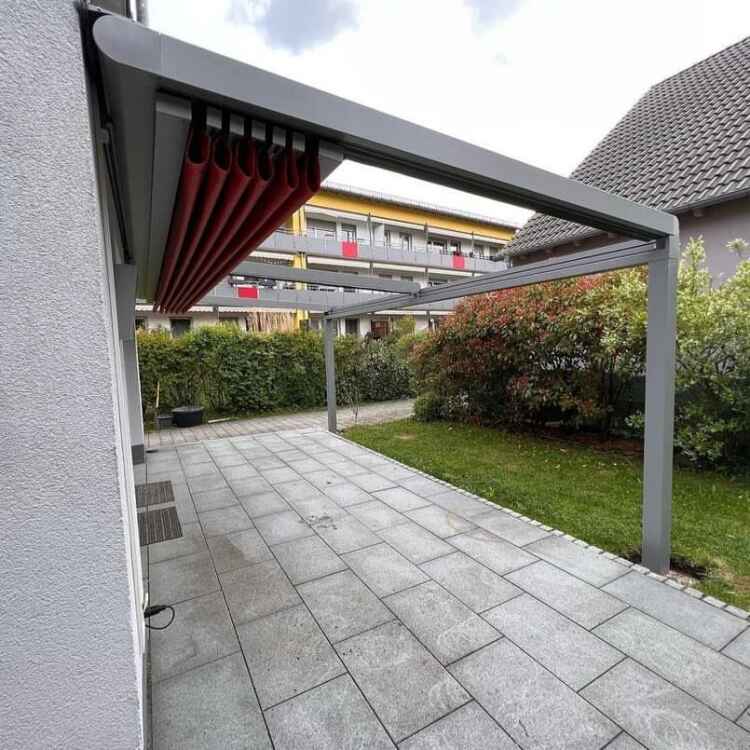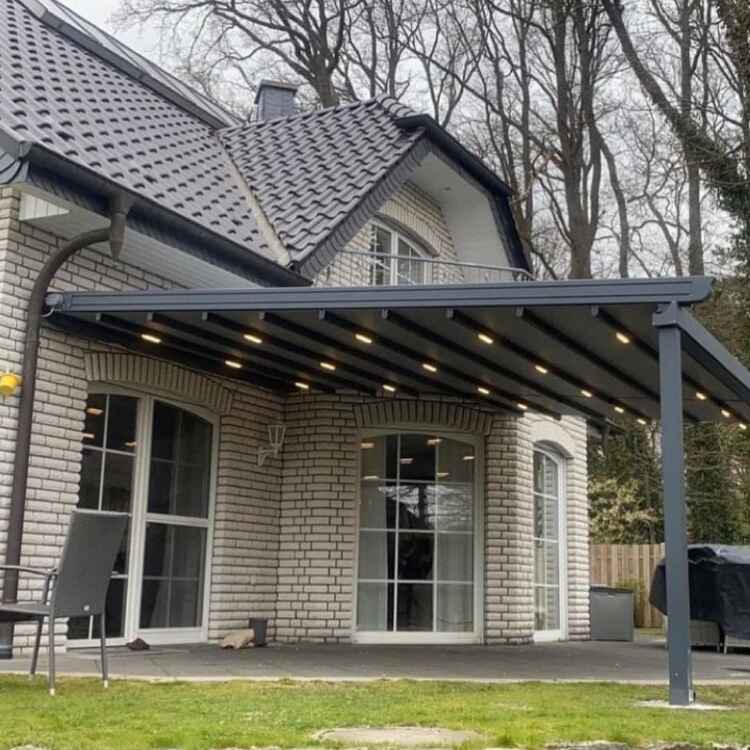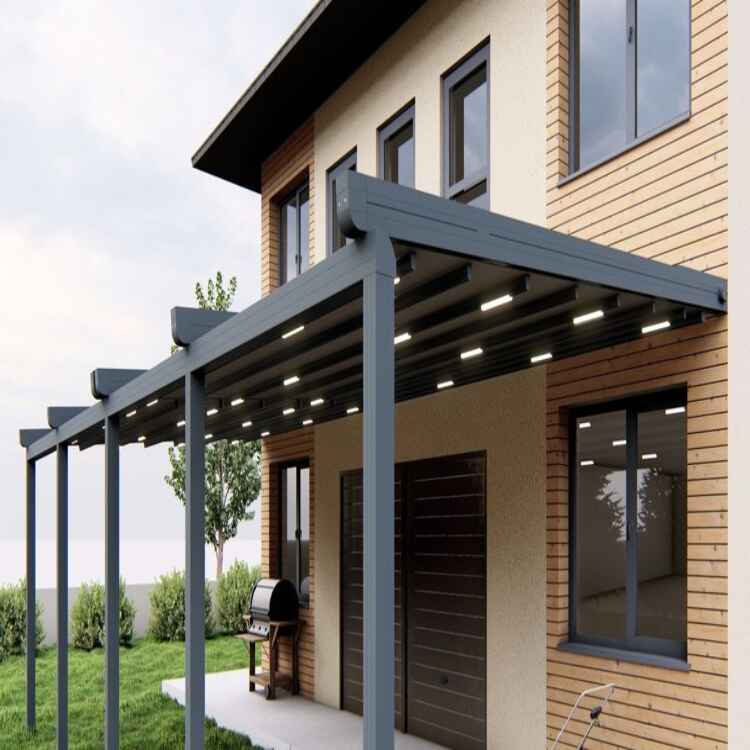Discover the benefits, types, features, and installation tips for modern pergola awnings. Stylish, durable, and ideal for year-round outdoor comfort.
| Products | Size | Price | Material |
|---|---|---|---|
| Pergola | Under 10m² | 110 € | Motorized |
| Awning | Above 20m² | 110 € | Motorized |
| Zip Curtain | 9m² | 900 € | Local Fabric |
| Bioclimatic Pergola (Piston) | Under 20m² | 350 € | Motorized |
| Rolling Roof (Scissor) | Above 25m² | 300 € | Motorized |
| Glass Ceiling | Under 10m² | 250 € | - |
| Winter Garden | Under 10m² | 300 € | Motorized |
| Aluminum Ceiling | Above 20m² | 350 € | Motorized |
| Heat Glass Sliding | Under 10m² | 110 € | - |
| Sliding Glass | Above 10m² | 110 € | - |
| Guillotine Glass | Unit | 65 € | Motorized |
| Double Opening Awning | Above 20m² | 110 € | Motorized |
| Single Carport | - | 6500 € | Motorized |
| Double Carport | - | 8500 € | Motorized |
| Bioclimatic Ceiling | Under 10m² | 350 € | Motorized |
| Terrace Roof Pergola | Under 10m² | 65 € | Motorized |
What is a Pergola Awning?
A Pergola Awning is a sophisticated architectural element designed to elevate outdoor living spaces by providing adaptable and elegant shading solutions. Unlike standard awnings, these systems are meticulously engineered to blend functionality with modern design, offering protection against sun, rain, and wind while complementing the aesthetics of terraces, gardens, patios, and balconies. Constructed from premium materials such as powder-coated aluminum, stainless steel, or advanced weather-resistant fabrics, pergola awnings ensure durability and longevity even in harsh environmental conditions.
One of the most defining features of a pergola awning is its flexibility. With options ranging from manual retractable panels to fully automated motorized systems, users can easily adjust the level of shading and ventilation according to their comfort needs. These awnings often include adjustable angles or slats that optimize sunlight exposure, reduce heat build-up, and enhance airflow, creating a comfortable microclimate outdoors. Beyond their practical benefits, pergola awnings also serve as architectural statements, elevating property value and visual appeal.
The versatility of pergola awnings makes them suitable for both residential and commercial applications. Whether installed in a private villa, a bustling café, or a corporate terrace, these structures transform ordinary outdoor spaces into multifunctional living or entertaining areas that can be enjoyed throughout the year. The integration of smart technologies, such as weather sensors and remote controls, further modernizes pergola awnings, making them not only stylish but also highly convenient and energy efficient. Overall, a pergola awning represents a harmonious blend of design, comfort, and functionality tailored for contemporary outdoor living.
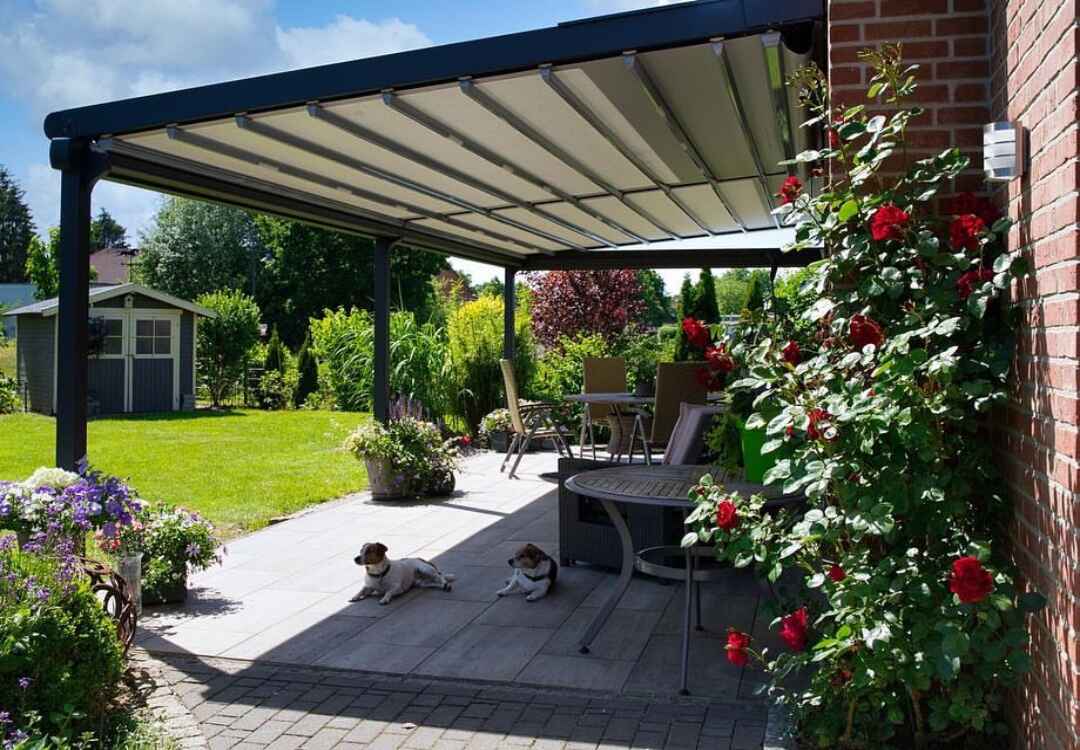
What is a Pergola Awning and What is it Used For?
A Pergola Awning serves multiple vital functions, primarily aimed at enhancing the usability and comfort of outdoor spaces. At its core, this structure is designed to shield patios, terraces, and garden areas from the intense effects of direct sunlight, which can cause discomfort and damage to outdoor furnishings over time. By providing a shaded canopy, pergola awnings significantly reduce ultraviolet (UV) exposure, preventing fabric fading, wood warping, and other forms of deterioration caused by prolonged sun exposure.
Beyond sun protection, pergola awnings offer shelter against light rain and moderate winds, allowing outdoor areas to remain functional regardless of weather fluctuations. This capability transforms conventional open-air spaces into versatile extensions of indoor living areas where people can entertain guests, dine al fresco, or simply unwind. The integration of adjustable or retractable panels further enhances this versatility, enabling users to customize their outdoor environment according to the weather, time of day, or desired privacy level.
In addition to these practical applications, pergola awnings play an increasingly important role in contemporary architectural design. Modern models often incorporate sleek lines, premium materials, and cutting-edge technology, contributing both to the aesthetics and the environmental performance of buildings. For example, by controlling the amount of sunlight entering adjacent rooms, pergola awnings can reduce indoor cooling loads, leading to lower energy consumption and increased sustainability.
Moreover, advanced options such as motorized operation, automated sensors, and bioclimatic features allow pergola awnings to dynamically respond to environmental changes, ensuring optimal comfort with minimal user intervention. Whether for private homes, restaurants, cafes, or commercial terraces, pergola awnings represent an elegant and practical solution that enhances outdoor living spaces, making them more enjoyable, functional, and visually appealing.


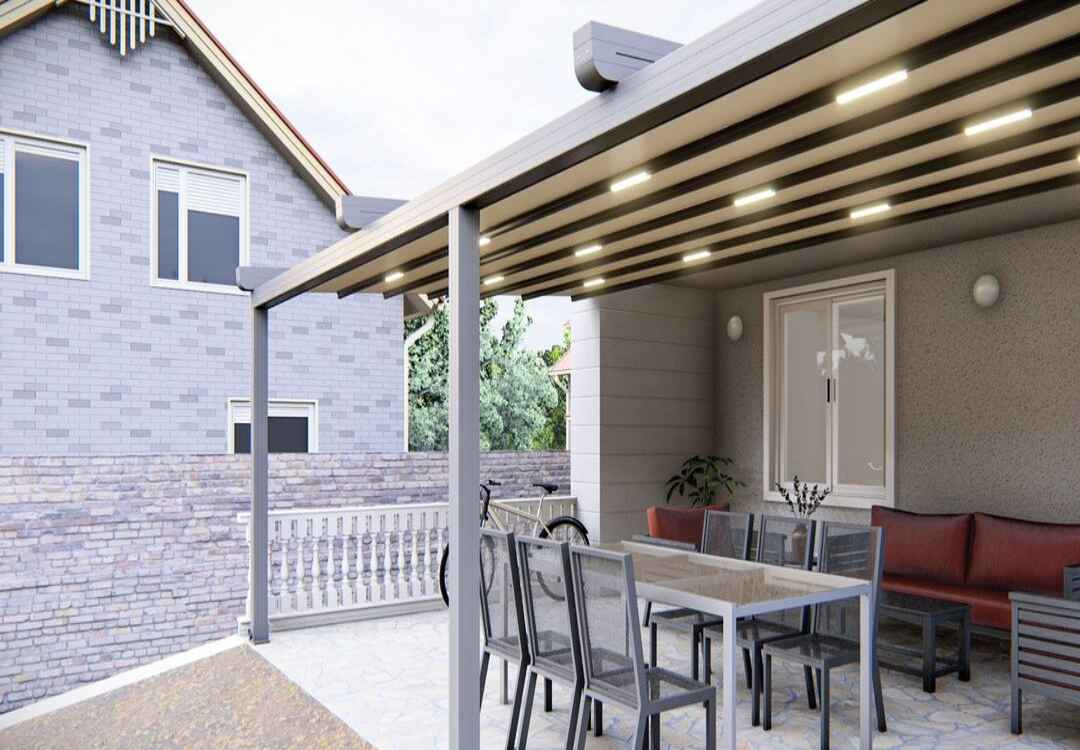
What are Pergola Awning Models?
Pergola awnings come in a variety of models designed to meet diverse aesthetic tastes, functional requirements, and technological preferences. The most common types include manual retractable awnings, motorized systems, bioclimatic pergolas, and piston-operated variants, each offering distinct advantages.
Manual retractable pergola awnings provide a straightforward, cost-effective shading solution where the fabric or panels can be extended or retracted by hand, usually through a crank mechanism. These systems are favored for their simplicity and low maintenance, making them ideal for smaller residential setups or areas where budget constraints are paramount.
Motorized pergola awnings elevate convenience by incorporating electric motors controlled via remote, wall switches, or even smartphone apps. These systems often integrate with smart home devices and weather sensors, enabling automatic adjustments in response to changing conditions such as sunlight intensity, rain, or wind. Motorized models offer smooth, effortless operation and are suited for both residential and commercial environments.
Bioclimatic pergolas represent the pinnacle of adaptive outdoor shading technology. Equipped with adjustable louvers or slats, these systems regulate sunlight, airflow, and rainwater drainage with precision. The louvers can be tilted to maximize ventilation or closed tightly to provide waterproof shelter, offering a perfect balance between natural light and protection. Their environmentally responsive design enhances comfort, energy efficiency, and usability across seasons.
Piston pergola awnings utilize hydraulic or pneumatic pistons to facilitate smooth extension and retraction. These mechanisms provide superior structural stability and tension control for the fabric or panels, ensuring durability and resistance against wind stress. The pistons contribute to silent operation and enhance the longevity of the awning system, making them suitable for high-demand or professional settings.
Materials also play a significant role in model differentiation. Aluminum frames combined with weather-resistant fabrics are popular for their strength, corrosion resistance, and lightweight properties, while stainless steel and glass components may be employed for more luxurious or architectural designs.
Overall, the wide range of pergola awning models allows users to select a system tailored to their specific needs, balancing style, functionality, ease of use, and budget considerations.
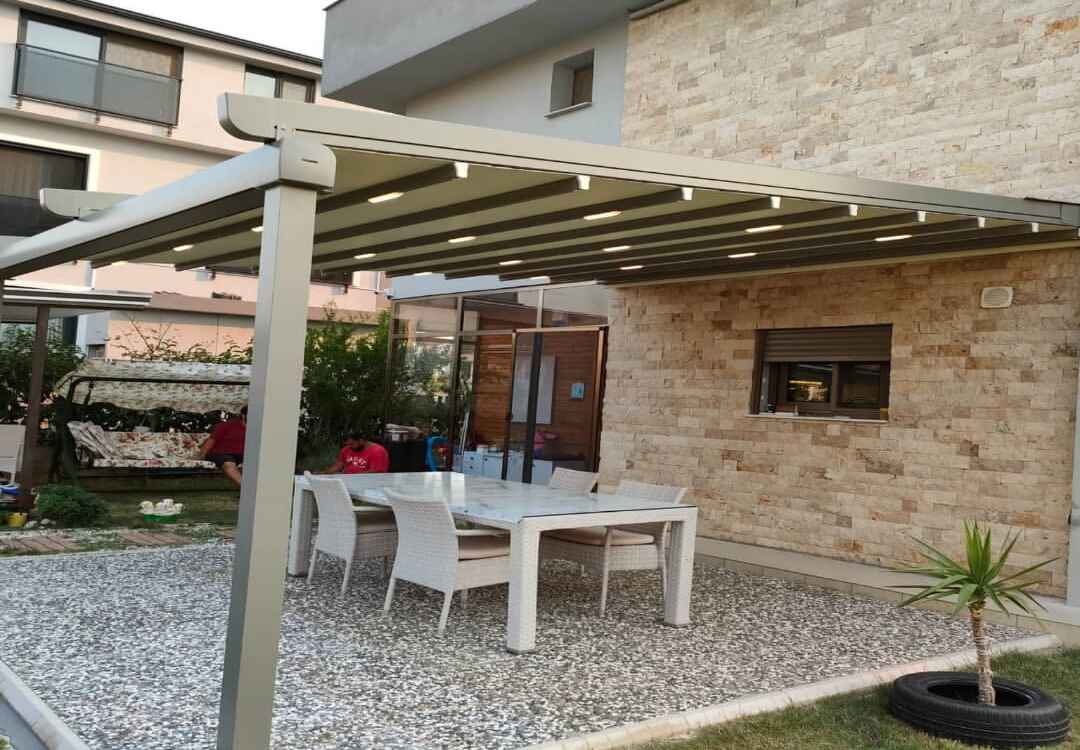
What are the Features of a Piston Pergola Awning?
A Piston Pergola Awning is distinguished by its incorporation of hydraulic or pneumatic pistons, which serve as the core mechanical components for extending and retracting the awning fabric or panels. This design delivers several noteworthy features that contribute to the system’s smooth functionality, durability, and overall performance.
One of the primary benefits of piston technology is the ability to maintain constant tension on the fabric, ensuring that it remains taut and secure even in windy conditions. This prevents sagging, flapping, and wear, which can compromise both aesthetics and lifespan. The pistons also enable effortless operation, reducing the physical effort required to adjust the awning, especially in manual models. When combined with motorized systems, piston pergolas achieve near-silent movement and precise control.
Durability is a hallmark of piston pergola awnings. The pistons themselves are crafted from corrosion-resistant materials and sealed to protect internal components from environmental damage. This robustness extends the overall life of the pergola, making it suitable for residential and commercial use in a wide range of climates.
Additional features often include adjustable tension settings, which allow customization of fabric resistance according to environmental factors or user preference. This adaptability enhances comfort and safety, particularly during windy or rainy conditions.
Many piston pergola awnings also support integration with auxiliary elements such as LED lighting and outdoor heating systems. This combination transforms the outdoor area into a multifunctional space usable in various weather and times of day, increasing the system’s utility and value.
From a design perspective, piston pergolas offer extensive customization options, including color finishes, fabric types, and structural dimensions, ensuring harmony with existing outdoor décor. Furthermore, the efficient water drainage capabilities prevent water pooling and facilitate quick drying, protecting furniture and flooring beneath.
In essence, the piston pergola awning stands out as a reliable, versatile, and elegant shading solution that meets modern demands for comfort, aesthetics, and durability.
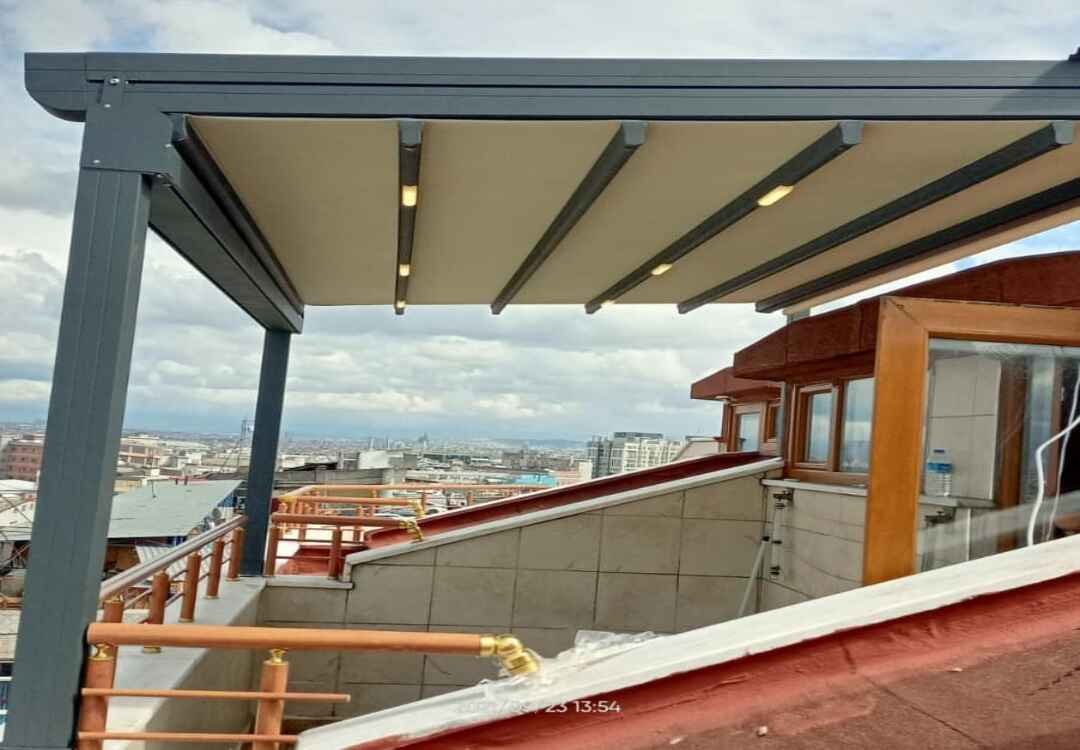
What are the Differences Between a Bioclimatic and a Motorized Pergola?
The distinction between Bioclimatic and Motorized Pergolas centers primarily on their operational mechanisms and environmental responsiveness. Both types offer automation and remote control options, but their core functionalities diverge significantly.
Bioclimatic Pergolas are engineered with adjustable louvers or slats that can be tilted to regulate sunlight, airflow, and rainwater drainage. This feature provides precise environmental control, enabling users to optimize comfort by balancing shade, natural light, and ventilation. The louvers can fully close to protect against rain or open to maximize fresh air circulation, making bioclimatic systems highly adaptable to changing weather. Their design enhances energy efficiency by controlling heat gain and promoting passive cooling, thereby reducing indoor climate control demands.
In contrast, Motorized Pergolas typically feature fixed roofs or retractable fabric canopies operated by electric motors. These systems focus on ease of use and convenience, allowing users to extend or retract the shading quickly with the push of a button. However, they do not inherently regulate airflow or sunlight with the same granularity as bioclimatic pergolas. While motorized pergolas may include waterproof fabrics or solid panels for rain protection, their environmental adaptability is limited compared to the dynamic louver mechanism.
Both systems may integrate with smart home controls, weather sensors, and automation to enhance usability, but the bioclimatic pergola’s ability to physically modify its structure offers superior climate management and comfort customization. Motorized pergolas are generally more affordable and simpler in design, appealing to users prioritizing mechanical reliability and straightforward operation.
Ultimately, the choice between a bioclimatic and a motorized pergola depends on the desired level of climate control, budget, aesthetic preferences, and specific outdoor living needs. Bioclimatic pergolas excel in sophisticated environmental responsiveness, while motorized pergolas emphasize user-friendly convenience.
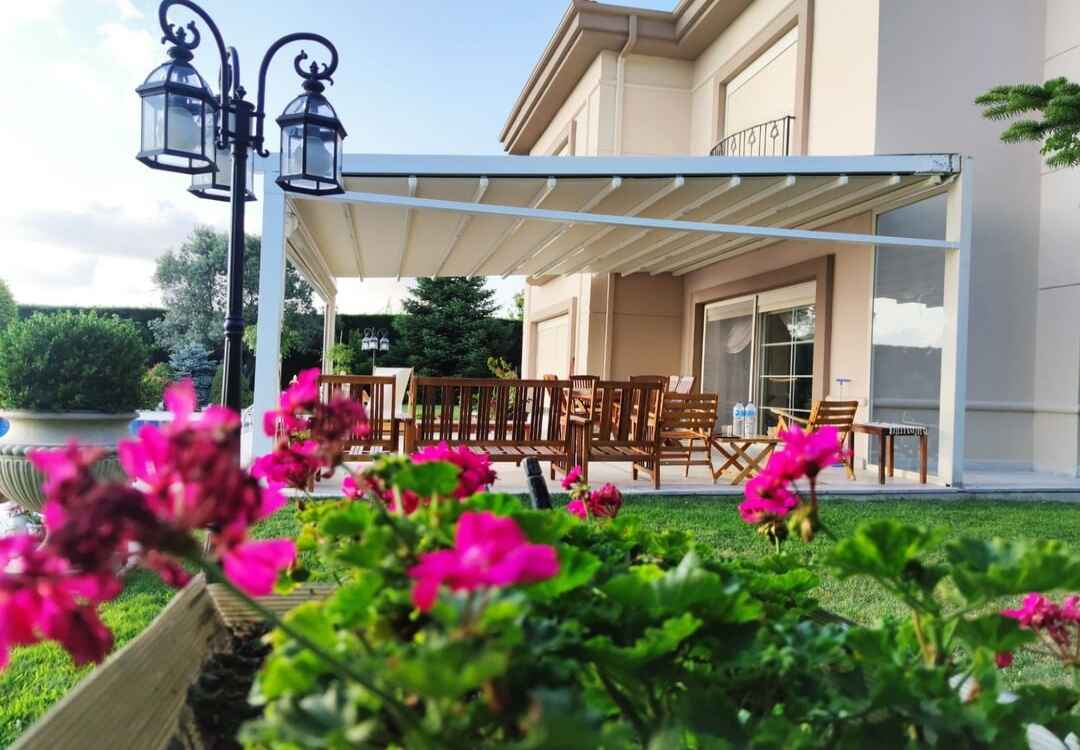
What is an Aluminum Pergola and What is it Used For?
An Aluminum Pergola is a modern outdoor structure primarily constructed from aluminum, known for its exceptional strength, lightweight nature, and resistance to corrosion. These pergolas have gained immense popularity due to their versatility, durability, and minimal maintenance requirements. Unlike traditional wooden pergolas, aluminum frameworks do not warp, crack, or require frequent painting, making them ideal for various climates, especially humid or coastal environments where moisture can accelerate wood decay.
The aluminum construction allows for elegant, sleek designs that complement contemporary architecture while offering structural stability to support wide spans without additional columns or braces. This attribute is especially valuable in creating open, unobstructed outdoor spaces such as patios, gardens, restaurant terraces, and commercial rooftops.
Aluminum pergolas are often combined with retractable fabrics, glass panels, or bioclimatic louver systems to create customizable environments suited for all seasons. The powder-coated finishes available in various colors provide aesthetic flexibility and protect against UV rays and weathering, ensuring the pergola maintains its appearance for many years.
Functionally, aluminum pergolas provide shade, shelter from rain, and wind protection, enhancing outdoor usability while reducing exposure to harsh elements. They transform ordinary exterior spaces into comfortable living or dining areas, extending usable space for homeowners and businesses alike. Furthermore, their modular nature facilitates easier installation and future expansions or modifications.
In summary, aluminum pergolas represent a perfect marriage of functionality, durability, and design elegance. They are widely used in residential backyards, luxury villas, cafes, restaurants, hotels, and commercial venues, where long-lasting, stylish outdoor shading solutions are required.
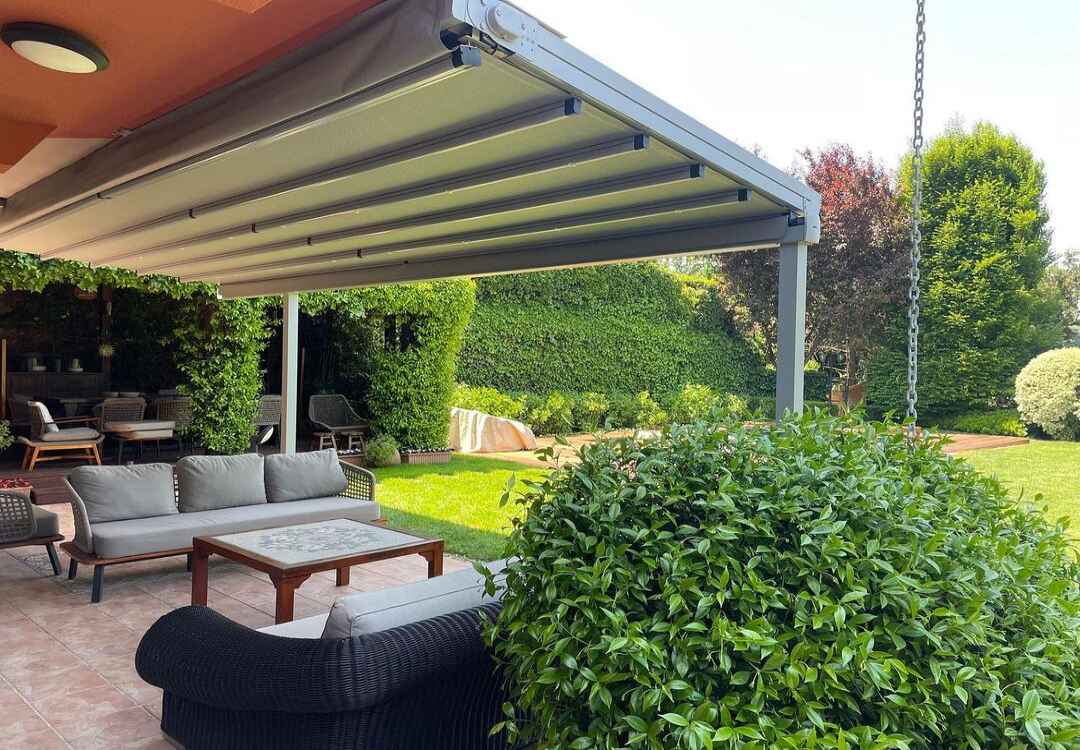
Is It Advantageous to Have a Pergola Awning Built?
Investing in a pergola awning offers numerous tangible and intangible advantages that significantly enhance outdoor living experiences and property value. Firstly, it extends the functional living area beyond indoor confines, transforming terraces, gardens, and patios into comfortable, weather-protected spaces that can be used throughout the year.
One of the core benefits is the ability to control exposure to environmental elements. Pergola awnings provide essential shade during hot summer months, dramatically reducing UV radiation and heat accumulation in adjacent indoor areas. This natural cooling effect not only enhances outdoor comfort but also contributes to lower energy bills by reducing the need for air conditioning.
Moreover, pergola awnings offer reliable shelter from light rain and wind, allowing outdoor areas to remain operational and enjoyable despite weather fluctuations. This versatility increases the usability and enjoyment of outdoor spaces for dining, entertaining, or relaxation, making them invaluable for both private homeowners and commercial establishments like cafes, restaurants, and hotels.
Aesthetic enhancement is another critical advantage. Pergola awnings are available in various designs, materials, and finishes, enabling seamless integration with existing architecture and landscaping. Their presence adds a modern, sophisticated look that elevates the overall visual appeal and marketability of the property.
Technological innovations further enhance the benefits. Motorized systems with automation, smart sensors, and remote controls offer effortless operation and real-time adjustments based on weather conditions. Integration with lighting and heating solutions transforms outdoor spaces into cozy, functional areas regardless of season or time of day.
Lastly, the increase in property value cannot be overlooked. A well-designed pergola awning is considered a premium upgrade, often attracting higher resale value and greater buyer interest. It also represents a long-term investment in lifestyle quality, comfort, and outdoor enjoyment.
In essence, having a pergola awning built is not just a decorative addition but a smart, multifunctional upgrade that optimizes outdoor living with practical, aesthetic, and financial returns.
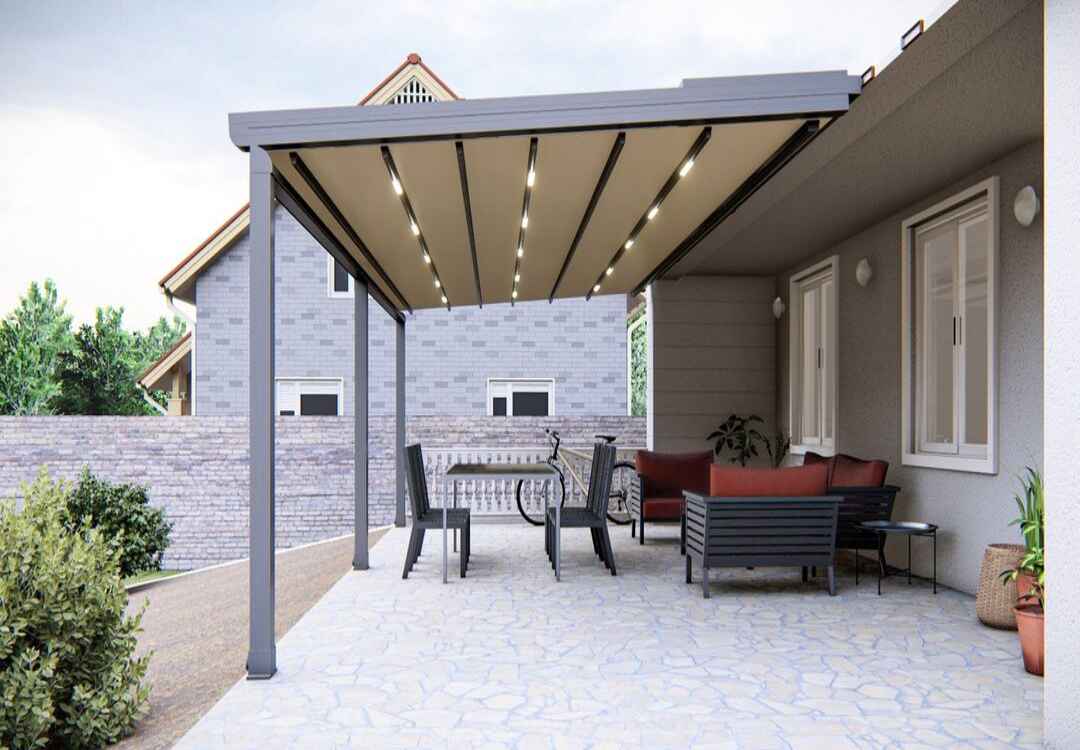
What is a Bioclimatic Rolling Roof System?
A Bioclimatic Rolling Roof System is an advanced and innovative outdoor shading solution that merges the dynamic functionality of a rolling roof with the environmental adaptability of bioclimatic technology. This system features adjustable louvers or slats integrated into a rolling roof mechanism, allowing users to fully open or close the roof while simultaneously regulating sunlight, airflow, and rainwater drainage.
What distinguishes the bioclimatic rolling roof is its capacity for real-time environmental responsiveness. Equipped with sensors that monitor weather conditions such as sunlight intensity, temperature, humidity, and rainfall, the system automatically adjusts the position of the louvers to optimize comfort and energy efficiency. For example, the slats can open to maximize ventilation and natural light on warm, sunny days, or close tightly to provide waterproof protection during rain, all while maintaining a balanced indoor-outdoor experience.
The rolling roof mechanism adds an additional layer of flexibility, enabling full retraction of the roof structure to create an open-air environment when desired. This versatility allows outdoor spaces to transition seamlessly from shaded retreats to open skies, depending on the occasion or weather.
Bioclimatic rolling roof systems are often integrated with smart home technologies, lighting, and heating elements to create multifunctional outdoor living areas that are comfortable year-round. Their modular design supports scalability, making them suitable for residential patios, commercial terraces, restaurants, event spaces, and more.
In terms of aesthetics, these systems combine sleek architectural lines with cutting-edge materials such as aluminum and high-performance fabrics, ensuring both durability and visual appeal.
In summary, the Bioclimatic Rolling Roof System is a sophisticated outdoor shading solution designed to enhance comfort, usability, and energy efficiency by intelligently adapting to environmental changes while providing ultimate flexibility through its rolling roof capability.
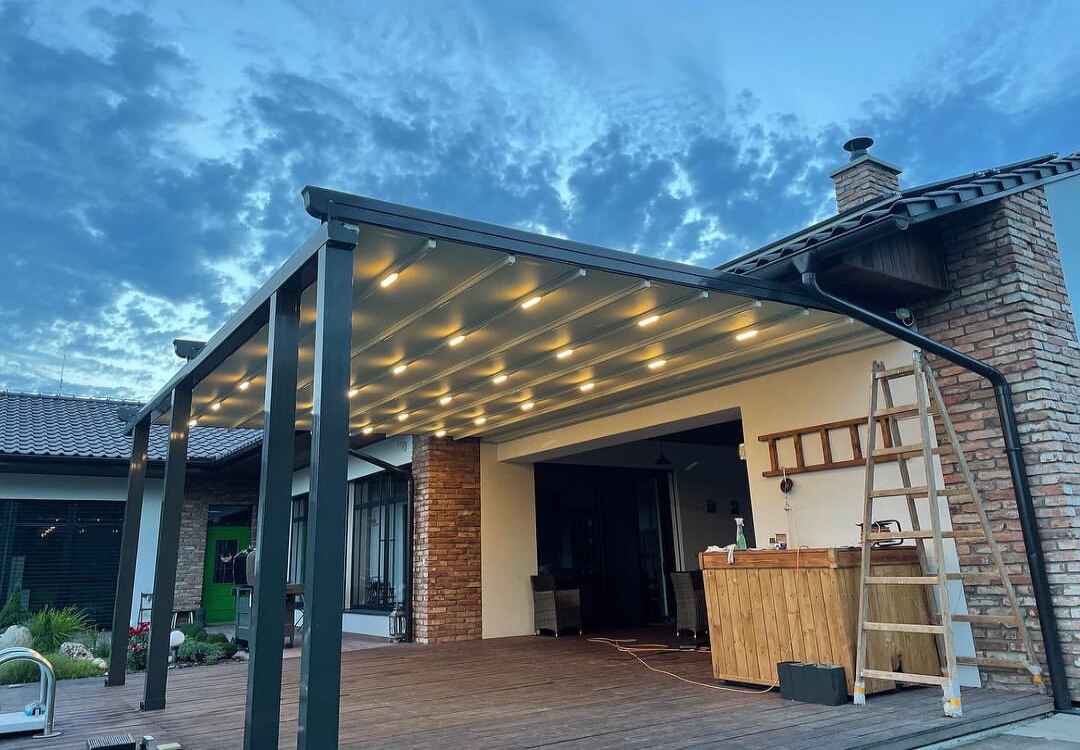
Pergola Awning… But Which Brand? / Highlight Our Pergola Awning Company
Choosing the right pergola awning brand is a crucial decision that directly impacts the quality, durability, and overall satisfaction of your outdoor shading investment. A reputable brand differentiates itself by prioritizing superior materials, innovative engineering, and exceptional customer service.
Our pergola awning company stands out in the competitive market through a commitment to craftsmanship, technological innovation, and customization. We source premium-grade aluminum, stainless steel, and high-performance fabrics, ensuring that every pergola system we deliver is designed to withstand diverse weather conditions while maintaining elegant aesthetics.
One of our core strengths lies in offering a broad portfolio of solutions, ranging from manual to fully automated motorized awnings, bioclimatic pergolas with adjustable louvers, piston-based systems, and bespoke designs tailored to each client’s architectural and functional needs. Our integration of smart home compatibility, weather sensors, LED lighting, and heating options provides a comprehensive approach to modern outdoor living.
Customer satisfaction is further enhanced by our professional installation teams, reliable after-sales support, and comprehensive warranties that protect your investment. Our products undergo rigorous testing and comply with international quality standards, ensuring long-term performance and safety.
Choosing our brand means benefiting from decades of industry experience, a strong network of satisfied clients, and a continuous dedication to innovation and excellence. We strive to make every pergola awning not just a shading system but a transformative outdoor experience that enriches your lifestyle.
In conclusion, selecting a trusted pergola awning brand—especially one that combines quality, service, and innovation—is fundamental for achieving lasting comfort, style, and value in your outdoor spaces.
Pergola Awning System Manufacturers in Turkey
Turkey has emerged as a significant hub for pergola awning system manufacturing, renowned for its blend of craftsmanship, technological advancement, and competitive pricing. Turkish manufacturers have successfully positioned themselves on the global stage by producing high-quality, customizable pergola systems that meet stringent international standards.
These manufacturers specialize in a broad spectrum of models, including motorized retractable awnings, piston systems, bioclimatic pergolas, and rolling roof systems. Utilizing durable materials such as powder-coated aluminum, stainless steel, and advanced, weather-resistant fabrics, Turkish companies emphasize longevity, corrosion resistance, and design innovation.
A key advantage of Turkish pergola awning manufacturers is their ability to provide bespoke solutions tailored to diverse climatic conditions and architectural styles. With skilled engineering teams and modern production facilities, they offer flexible sizing, color options, and integration with smart home automation systems.
Furthermore, many manufacturers in Turkey maintain strong R&D departments focused on developing energy-efficient, sustainable shading solutions that align with global environmental standards. This commitment has led to widespread acceptance of Turkish pergolas in residential, commercial, and hospitality sectors worldwide.
The competitive cost structure in Turkey, combined with high craftsmanship levels, makes these manufacturers attractive partners for both local and international clients seeking cost-effective, durable, and aesthetically pleasing pergola systems.
In addition to manufacturing, many Turkish companies provide turnkey services, including professional installation, maintenance, and after-sales support, ensuring a seamless customer experience from purchase to long-term use.
Overall, Turkey’s pergola awning manufacturers are recognized for offering innovative, reliable, and customizable outdoor shading solutions that cater to the evolving needs of modern living and business environments.
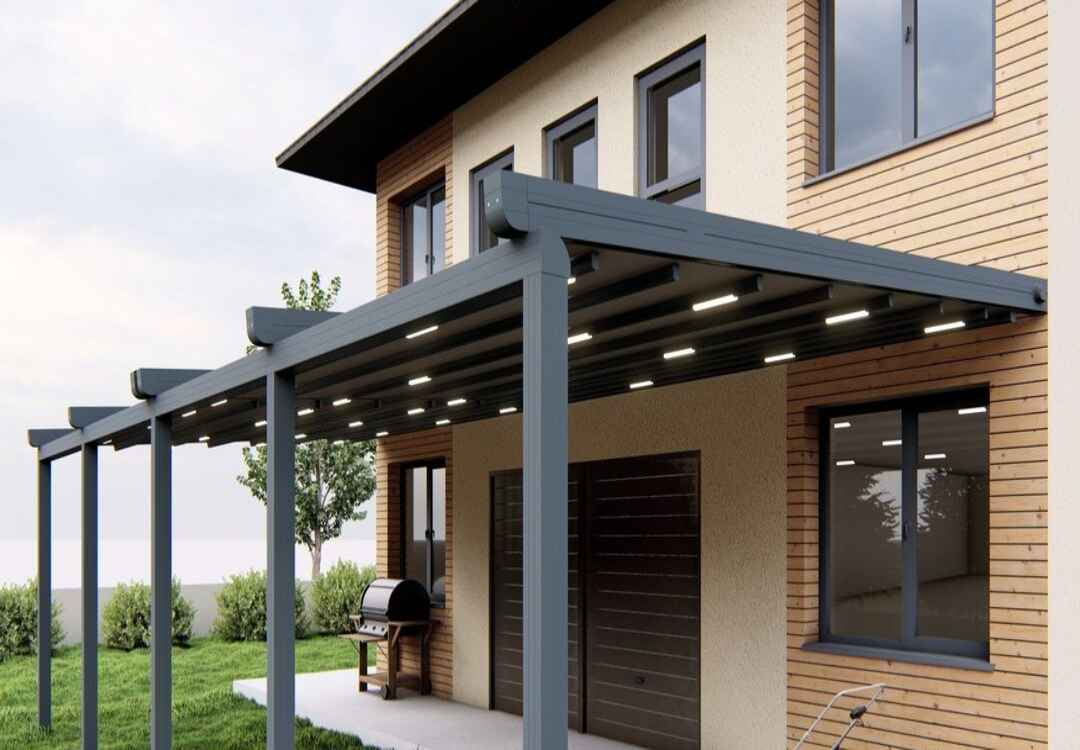
Pergola Awning… But Which One Should I Choose?
Choosing the ideal pergola awning involves carefully considering a variety of factors including your outdoor space dimensions, climate conditions, style preferences, and budget constraints. The decision is not merely about selecting a shading device but about enhancing your lifestyle and outdoor living experience with a structure that fits your specific needs perfectly.
First, evaluate the primary function you want from the pergola awning. If you seek maximum control over sunlight, ventilation, and rain protection, a bioclimatic pergola with adjustable louvers is the optimal choice. These systems allow you to precisely regulate environmental factors to create comfortable conditions year-round. If convenience and ease of use are paramount, motorized retractable pergola awnings with remote or app control provide smooth operation without manual effort.
Material selection also significantly influences the pergola’s performance and aesthetics. Aluminum frameworks offer durability, weather resistance, and minimal maintenance, ideal for long-term investments. Fabric options vary in opacity, color, and waterproofing capabilities, allowing customization of light and weather protection.
Consider additional features such as integrated LED lighting, infrared heating, and smart home compatibility, which can greatly enhance the versatility and usability of your pergola awning. These enhancements enable you to enjoy your outdoor space comfortably during evenings and colder months, effectively extending the pergola’s usability.
Furthermore, the space’s architectural style and your personal taste will guide the design and color choices, ensuring the pergola complements your home or business environment seamlessly.
Budget is an important factor, but it should be balanced against the value of quality materials, technology, and installation services. Investing in a reliable brand with proven warranties and customer support helps avoid costly repairs or replacements in the future.
In summary, the best pergola awning is one that balances functionality, aesthetics, durability, and ease of use to match your specific outdoor living needs. Consulting with experienced suppliers or manufacturers can provide personalized guidance to make an informed decision.
Is a Pergola Awning Waterproof?
Pergola awnings can offer a considerable degree of waterproof protection, but the level of water resistance largely depends on the system’s design, materials, and installation quality. Modern pergola awnings utilize advanced waterproof fabrics, engineered roofing panels, and integrated drainage solutions to ensure effective rain protection.
Bioclimatic pergolas, with their adjustable slats, excel in waterproofing because the louvers close tightly during rain, creating a sealed roof that directs water away through built-in gutters and drainage channels. This prevents water from pooling or leaking onto the covered area below, allowing outdoor spaces to remain dry even during moderate rain.
Retractable fabric pergolas employ high-grade, water-resistant materials often coated with polyurethane or PVC membranes to repel water. When tensioned correctly, these fabrics create a taut canopy that minimizes water ingress. However, fabric awnings generally perform best in light to moderate rain conditions; heavy storms might challenge their waterproof capacity unless paired with reinforced support structures.
Motorized pergolas enhance waterproofing by enabling quick closure during unexpected weather changes, controlled remotely or automatically via sensors. Proper installation with correct slope angles and drainage routes is essential to prevent water accumulation and leakage.
It is important to note that while pergola awnings provide substantial rain protection, they are not typically designed to withstand extreme weather events such as heavy storms or snow loads without additional structural reinforcements.
In conclusion, pergola awnings designed with quality waterproof materials and smart drainage systems offer reliable protection against rain, significantly increasing outdoor usability without compromising comfort or aesthetics.
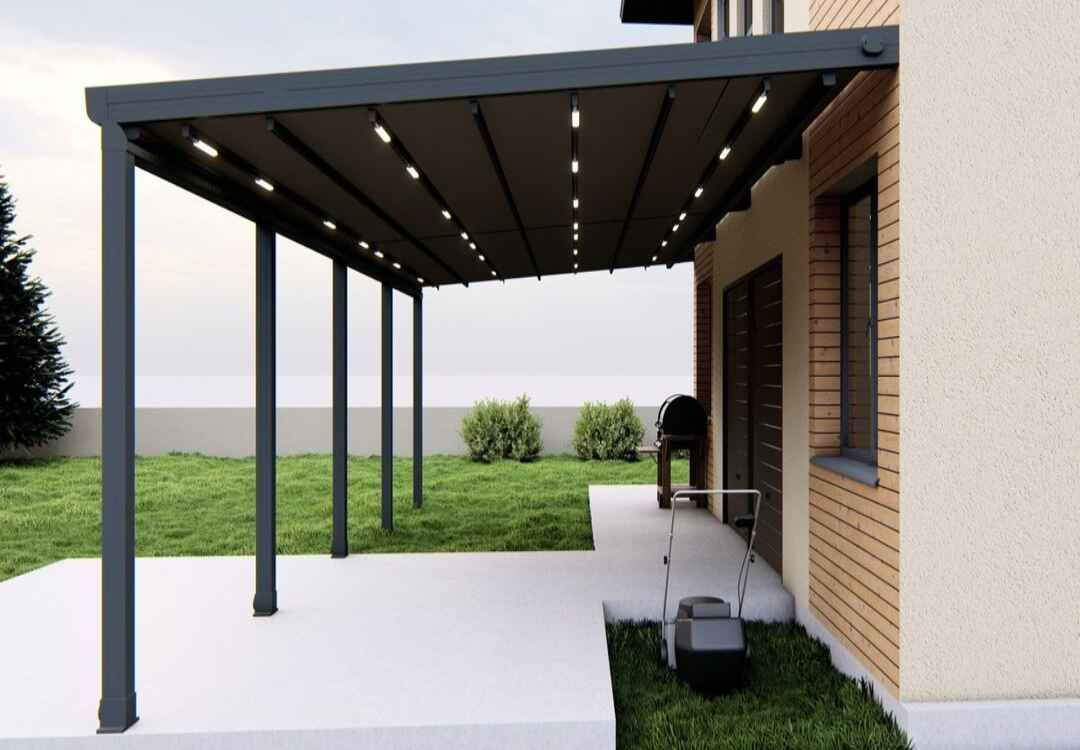
Pergola Awning Manufacturers… But Which One? Highlight Us as an Istanbul Company
When it comes to choosing a pergola awning manufacturer, selecting a company known for quality, innovation, and reliability is crucial. As an Istanbul-based manufacturer, we pride ourselves on delivering state-of-the-art pergola awning systems that blend craftsmanship with modern technology and superior materials.
Our company’s location in Istanbul positions us at the crossroads of diverse architectural influences and cutting-edge manufacturing techniques, enabling us to cater to both local and international markets with customized solutions tailored to various climates and design preferences.
We emphasize the use of premium-grade aluminum, corrosion-resistant hardware, and high-performance, weatherproof fabrics to ensure durability and longevity. Our product range includes manual, motorized, bioclimatic, and piston pergolas, each engineered for optimal performance and aesthetic appeal.
We offer full-service solutions that encompass design consultation, professional installation, and after-sales support, guaranteeing that each client’s project is executed flawlessly from start to finish. Our integration of smart home automation, LED lighting, and heating options ensures that our pergolas provide year-round comfort and usability.
Customer satisfaction is our top priority, and we back our products with comprehensive warranties and responsive service, positioning us as a trusted partner in outdoor shading solutions.
By choosing an Istanbul-based manufacturer like us, clients benefit from competitive pricing without compromising on quality, access to experienced engineers and technicians, and proximity to a rich network of suppliers and logistical support.
In summary, our Istanbul company offers reliable, innovative, and customizable pergola awning systems that transform outdoor spaces with style, functionality, and lasting value.
What are the Technical Features of a Pergola Awning?
The technical features of a pergola awning are critical to its performance, durability, and user experience. Understanding these components helps in selecting a system that meets specific functional and aesthetic requirements.
Material Quality: Premium pergolas use anodized or powder-coated aluminum frames, stainless steel fittings, and UV-resistant, waterproof fabrics to ensure long-lasting durability and resistance to environmental damage such as rust, fading, and corrosion.
Motorization and Automation: Many modern pergolas incorporate electric motors, piston mechanisms, or hydraulic systems for smooth, reliable extension and retraction. Automation features include remote controls, smartphone apps, and integration with smart home systems. Sensors detect wind, rain, and sunlight to automatically adjust the awning, enhancing safety and convenience.
Adjustable Slats: Bioclimatic pergolas feature adjustable louvers that can be tilted to control sunlight, airflow, and rainwater drainage. This adaptability improves energy efficiency by optimizing natural ventilation and shade.
Waterproofing: Engineered fabrics with waterproof coatings and sloped roof designs channel water effectively through built-in drainage systems, keeping covered areas dry during rainfall.
Lighting and Heating Integration: LED lighting systems integrated into pergola frames provide ambient illumination for nighttime use, while infrared or electric heaters extend comfort into cooler seasons.
Size and Customization: Pergola awnings come in various modular sizes and configurations, allowing coverage of small balconies to large commercial terraces. Custom color finishes and fabric patterns enable personalization to suit architectural styles.
Structural Stability: Reinforced frames and tensioning systems maintain awning integrity against wind loads and environmental stresses, ensuring safety and longevity.
Together, these technical features make pergola awnings highly versatile, energy-efficient, and user-friendly, offering superior outdoor comfort across diverse applications.
Is It Advantageous to Have a Pergola Awning Built?
Building a pergola awning offers numerous benefits that extend far beyond simple shading. One of the primary advantages is the significant increase in usable outdoor living space. By providing reliable shelter from sun, rain, and wind, pergola awnings effectively transform patios, gardens, balconies, and terraces into comfortable, versatile areas that can be enjoyed year-round. This expansion of functional space is particularly valuable for those looking to entertain guests, dine al fresco, or simply relax outdoors in comfort.
From a financial perspective, investing in a pergola awning can enhance property value. The aesthetic upgrade provided by a well-designed pergola introduces a modern and sophisticated architectural element to the exterior of any home or commercial property. This appeal is attractive to potential buyers or clients, making it a smart investment.
Modern pergola awnings also incorporate advanced features such as motorization, automation, and smart home integration. These innovations allow users to control light exposure, shading, and privacy with minimal effort, improving convenience and lifestyle quality. Additionally, these systems contribute to energy efficiency by reducing heat gain in adjacent indoor areas, which can lower cooling costs during warmer months.
Furthermore, pergola awnings promote outdoor living health benefits by encouraging time spent in fresh air while protected from harsh sunlight and weather elements. For commercial venues like cafes, restaurants, or hotels, pergola awnings extend business opportunities by making outdoor spaces usable regardless of weather fluctuations, increasing guest satisfaction and revenue potential.
In summary, having a pergola awning built is advantageous for enhancing lifestyle comfort, boosting property value, promoting energy efficiency, and creating elegant, functional outdoor environments for both private and commercial use.
Why Should You Have a Pergola Awning System Installed?
Installing a pergola awning system presents a harmonious blend of comfort, practicality, and visual enhancement. One of the strongest reasons for installation is the ability to enjoy outdoor areas year-round. The system offers reliable sun protection during hot summer days and shelter from rain or wind, making outdoor spaces usable in a variety of weather conditions.
The integration of motorized controls and automation technology ensures effortless operation. Users can open, close, or adjust the awning with remote controls or through smart devices, responding quickly to changing weather without manual labor. This convenience is particularly beneficial in busy households or commercial settings.
Energy efficiency is another compelling advantage. By controlling the amount of sunlight entering the home or building, pergola awnings help regulate indoor temperatures. This shading effect reduces reliance on air conditioning systems, lowering electricity consumption and environmental impact.
Beyond function, pergola awnings elevate outdoor aesthetics, contributing a modern, sleek design element that enhances the overall appeal of the property. This visual enhancement can improve social gatherings by creating attractive, comfortable environments that encourage spending more time outdoors.
Moreover, pergola awnings are versatile and customizable, accommodating various sizes, colors, materials, and accessory options such as lighting and heating. This flexibility makes them suitable for diverse applications, from private gardens and terraces to commercial hospitality and workplace outdoor spaces.
Overall, installing a pergola awning system is a practical investment that enriches outdoor living, increases energy efficiency, and adds lasting beauty and value to any property.
What are the Usage Areas of a Pergola Awning?
Pergola awnings are remarkably versatile, making them suitable for an extensive array of environments and applications. Their adaptability in function and design allows them to enhance both residential and commercial spaces.
Homes & Villas: Pergola awnings extend living areas, providing shaded and weather-protected patios, balconies, or garden seating. They create comfortable outdoor lounges or dining areas, perfect for family gatherings or relaxation.
Cafes & Restaurants: Outdoor dining spaces benefit immensely from pergola awnings, offering customers shelter from sun and rain. This increases usable seating capacity and improves guest experience by allowing open-air dining throughout the year.
Workplaces: In corporate settings, pergola awnings provide shaded break areas or informal meeting spaces, promoting employee well-being and productivity by encouraging outdoor breaks in comfort.
Winter Gardens: These structures protect delicate glass or greenhouse environments, allowing controlled sunlight and ventilation while extending usability during colder months.
Wedding Venues: Elegant pergola awnings create sheltered outdoor spaces for ceremonies, receptions, or cocktail hours, enhancing comfort while contributing to the aesthetic appeal of special events.
Pools: Pergolas shade poolside lounges, protecting users from UV rays and creating stylish areas for relaxation and socializing.
Hotels & Terraces: Pergola awnings extend guest amenities outdoors, offering luxurious, comfortable spaces for dining, socializing, or relaxing in a variety of weather conditions.
Hospitals: They provide shaded, calming outdoor areas for patients and visitors, supporting rehabilitation and comfort in healthcare settings.
In essence, pergola awnings adapt to virtually any outdoor setting where protection from weather and improved aesthetics are desired, delivering multifunctional, attractive solutions across residential, commercial, and institutional sectors.
What are the Prices of Pergola Awnings Fabric Per M²?
The price of pergola awning fabric per square meter varies depending on several key factors including fabric type, system complexity, motorization, and any additional features. On average, high-quality pergola awning fabrics typically start around 110 Euros per square meter for motorized systems using durable aluminum frameworks and piston mechanisms.
Factors influencing the price include:
-
Fabric Material: Premium waterproof, UV-resistant, and breathable fabrics command higher prices due to enhanced durability and performance.
-
System Type: Bioclimatic or motorized systems with automation features tend to have more expensive fabric components compared to manual retractable awnings.
-
Additional Features: Integration of LED lighting, heating, sensor technology, or custom color finishes can increase the overall cost.
-
Size and Customization: Larger or uniquely shaped pergolas requiring custom fabrics may incur higher material costs.
While initial investment in quality fabrics may be higher, it ensures longevity, weather resistance, and optimal functionality, reducing long-term maintenance and replacement expenses.
Choosing professional installation services alongside premium materials guarantees that the pergola awning performs effectively and provides value for money over many years.
Frequently Asked Questions About Pergola Awning Systems
1. Are pergola awnings durable against wind and rain?
Pergola awnings are designed to withstand typical weather conditions, including moderate wind and rain. Modern systems utilize reinforced aluminum frames, tensioned fabrics, and integrated drainage channels to ensure stability and water runoff. Some advanced models, especially bioclimatic pergolas, feature adjustable louvers that close tightly to protect against rain and direct wind away from the structure. However, extreme weather such as storms or heavy winds may require retracting or securing the awning for safety. Overall, high-quality pergola awnings provide reliable durability and weather protection for most climates.
2. Can pergola awnings be automated?
Yes, most contemporary pergola awnings come with automation options. Motorized systems allow for easy extension, retraction, or adjustment using remote controls, wall switches, or even smartphone apps. Many models also integrate with smart home systems and weather sensors that can automatically adjust the awning based on sunlight, wind, or rain conditions. This automation enhances convenience and ensures the awning is optimally positioned for comfort and protection without manual effort.
3. What maintenance do pergola awnings require?
Pergola awnings generally require minimal maintenance to ensure longevity and optimal performance. Routine cleaning of the fabric with mild soap and water helps prevent dirt buildup and mold growth. It is also important to regularly check mechanical components, such as motors, joints, and pistons, to ensure smooth operation. For motorized systems, occasional professional servicing may be recommended to maintain electrical and mechanical integrity. Inspecting drainage channels and ensuring they remain clear will prevent water accumulation and fabric damage.
4. Can pergola awnings be customized for size, color, and materials?
Absolutely. Pergola awnings are highly customizable to fit specific outdoor spaces and design preferences. Manufacturers offer a wide range of sizes, colors, fabric types, and frame finishes. Custom options allow integration of additional features such as LED lighting, heating, and motorization systems tailored to individual needs. This flexibility ensures that the pergola awning complements the architectural style of the property while meeting functional requirements.
5. Are pergola awnings energy efficient?
Yes, pergola awnings contribute to energy efficiency by controlling the amount of sunlight that enters indoor spaces. By providing shade and reducing direct solar heat gain, they help keep adjacent rooms cooler during hot weather, lowering the need for air conditioning and thus reducing energy consumption. Some pergola models, especially bioclimatic ones with adjustable louvers, allow precise control of sunlight and ventilation, further optimizing energy savings and indoor comfort.
6. Is professional installation necessary for pergola awnings?
Professional installation is highly recommended for pergola awnings, especially for motorized or bioclimatic systems. Proper installation ensures structural stability, correct assembly of mechanical parts, and effective waterproofing. Experts also guarantee that electrical components, such as motors and sensors, are safely and correctly integrated. A professional install maximizes the lifespan and functionality of the pergola awning, while reducing the risk of damage or malfunction caused by improper setup.




